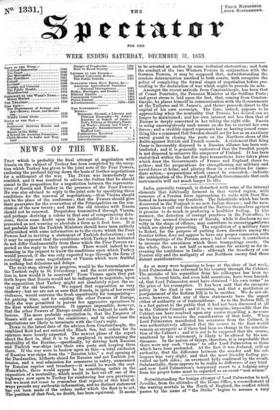NEWS OF THE WEEK.
THAT which is probably the final attempt at negotiation with Russia on the subject of Turkey has been completed by the recep- tion which Turkey has given to the joint note of the Four Powers, enclosing the protocol laying down the basis of further negotiations for a settlement of the war. The Divan was immediately as- sembled, and it was resolved to advise the Sultan that he should assent to the proposition for a negotiation between the representa- tives of Russia and Turkey in the presence of the Four Powers. He was also advised to reply to the joint note by specifying three conditions for the renewal of negotiations,—th at Vienna should not be the place of the conference ; that the Powers should give their guarantee for the evacuation of the Principalities on the con- clusion of the new treaty; and that the old treaties with Russia should not be renewed. Despatches transmitted through Vienna, and perhaps deriving a colour in that seat of compromising delu- sions, throw some doubt upon this }est condition. It is now re- presented as not wearing so absolute a form as it first bore. It is not probable that the Turkish Ministers should have been entirely unfurnished with some information as to the views which the Four Powers had in inviting a statement of Turkish declarations ; and it may be supposed that the conditions which Turkey has indicated do not differ fundamentally from those which the Four Powers ex- petted as the reply to their question. There would indeed be no meaning in the request to know the conditions upon which Turkey would proceed, if she was only expected to go through the form of reviving those same negotiations at Vienna which were fruitful in nothing but delusions and delays. The next step, already in progress, would be the transmission of the Turkish reply to St. Petersburg; and the next stirring ques- tion is, how would it be received? From Vienna again they put forth hopes that Russia would not be indisposed to negotiate, upon the supposition that Turkey might not absolutely reject the re- vival of the old treaties. We regard that supposition as very
shadowy; but we are not so sure that Russia, in spite of her recent violences, would contemn the fresh opportunity for temporizing—
for gaining time, and for cajoling the other Powers of Europe, while she was permitted to pursue her aggressive operations in the East without interruption. It appears impossible, however, that the other Powers of Europe could still be subject to such de- lusions. The more probable expectation is, that the Emperor of Russia will at once reject the conditions; and in either case the negotiations are likely to terminate with the Czar's reply. Down to the latest date of the advices from Constantinople, the combined fleet had not entered the Black Sea, but orders for its
entrance were hourly expected. The newest phase of the report about the fleet is, that it is to be employed in maintaining the neutrality of the Euxine,--speoifieally, by driving both Russian and Tartish war-ships into their own ports and keeping them there. If the war were to bestow upon us this—a total exclusion of Russian war-ships from the "Russian lake," a real opening of the Dardanelles, hitherto closed for Russian and not Turkish jea- lousies, and a real admission for commerce in safety, unmenaced by Russian caprice and treachery—it would be worth the cost. Meanwhile, there would appear to be something unfair in the imposition of a-neutrality, which would in fact out off one of the highways now open 'to Turkey for reinforcing her own provinces : but we must not cease to remember that reports of this kind al- 'Ways precede any authentic information, and no distinct statement has yet been made of the orders under which the fleet is to act. The position of that fleet, no doubt, has been equivocal. It seems
to be arrested at anchor by some technical obstruction; and from the conduct of the two Western Powers in conjunction with the German Powers, it may be supposed that, notwithstanding the resolute determination ascribed to both courts, both recognize the policy of completing the formal stages of negotiation before pro- ceeding to the declaration of war which ought to precede its acts. Amongst the recent arrivals from Constantinople, has been that of Count Ponrtales, the Prussian Minister at the Sublime Porte ; and great stress is laid upon the foot, that, ooming from Constan- tinople, he places himself in communication with the Governments at the Tuileries and St. James's, and thence proceeds direct to the capital of his own sovereign. The time, indeed, appears to be approaching when the neutrality that Prussia has desired can no longer be maintained; and her own interest not less than that of Europe is deeply concerned in her taking the right side. Russia is using unscrupulously such means as she has to recruit her own forces ; and a credible report represents her as having issued some- thing like a command that Sweden should act for her as an auxiliary naval guard in closing the ports on the Northern shore of the Baltic against British and French vessels. A statement that King Oscar is favourably disposed to a Russian alliance has been con- tradicted; and it is generally understood that the Swedish people is not disposed to subserve the conqueror of Finland. It has been stated that within the last few days transactions have taken place which draw the Governments of France and England closer to- gether; and the preparations for strengthening our military and naval forces at home, and placing them -in a condition for imme- diate aotion,—preparations which cannot be concealed,—indicate the anticipation of the French and English Governments that such instruments will not much longer lie idle.


































